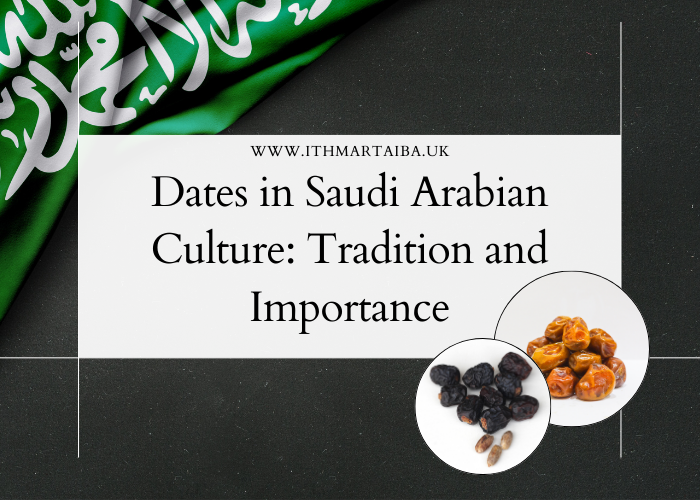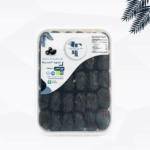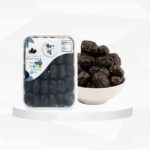No products in the cart.
“Pure, Natural, and Delicious — Dates You Can Trust.”

Dates in Saudi Arabian Culture: Tradition and Importance
Few foods in the world carry as much weight in tradition, history, and spirituality as dates in Saudi Arabian culture: tradition and importance. More than just a sweet treat, dates are tied to Saudi identity, hospitality, faith, health, and heritage. Whether you stroll through the vibrant markets of Riyadh, join a family gathering in Madinah, or witness the world’s largest date auction in Al-Qassim, one truth is clear: dates are more than food—they are a symbol of pride and culture.
From the chewy Ajwa of Madinah to the golden Sukkari and robust Safawi, each variety has its own story, flavor, and place in daily life. Let’s dive deeper into why dates in Saudi Arabian culture: tradition and importance are unmatched across the globe.
Dates in Saudi Arabian Culture: Tradition and Importancein Daily Life
In every Saudi home, you will find dates served with Arabic coffee—a timeless gesture of hospitality and respect. Offering dates is more than politeness; it reflects generosity and the deeply rooted values of Arabian society.
Walk through Saudi souks, and you’ll see baskets filled with Ajwa, Khudri, and Safawi—each date carrying centuries of history. Saudis enjoy dates as morning energy boosters, gifts for loved ones, or essential snacks during gatherings. This constant presence highlights the unshakable role of dates in Saudi Arabian culture: tradition and importance in everyday living.
Religious Value of Dates in Saudi Arabian Culture: Tradition and Importance
Beyond their sweetness, dates hold sacred significance. The Prophet Muhammad (peace be upon him) famously broke his fast with dates and water, a Sunnah millions of Muslims follow during Ramadan. This tradition gives dates a spiritual value that connects faith to nourishment.
Among all varieties, Ajwa dates stand out. Cultivated only in Madinah, they are revered not just for taste but also for their religious symbolism. Many Muslims consider Ajwa blessed, believing in its healing and protective benefits. Clearly, the religious role of dates in Saudi Arabian culture: tradition and importance is as powerful today as it was centuries ago.
Historical Role of Dates in Saudi Arabian Culture: Tradition and Importance
Long before oil wealth transformed Saudi Arabia, dates were the Kingdom’s lifeline. For Bedouins journeying across deserts, dates provided essential energy, hydration, and survival.
For centuries, trade caravans carried dates to neighboring lands, making them one of the region’s first and most valuable exports. The historical role of dates in Saudi Arabian culture: tradition and importance is one of resilience, as these humble fruits sustained generations through harsh climates and economic challenges.
Celebrations and Dates in Saudi Arabian Culture: Tradition and Importance
In Saudi celebrations, dates are ever-present. During Ramadan, Muslims across the Kingdom break their fast with dates. On Eid, beautifully decorated trays of dates symbolize joy and generosity.
At weddings, national festivals, and family events, dates are shared in abundance—whether plain, stuffed with nuts, or used in desserts like maamoul. These customs show how dates in Saudi Arabian culture: tradition and importance remain inseparable from moments of love, unity, and festivity.
Popular Saudi Date Types Showcasing Tradition and Importance
With more than 400 varieties grown in the Kingdom, Saudi Arabia is truly the heart of the date world. Here are the most celebrated:
- Ajwa Dates: Known as the “crown jewel,” Ajwa is chewy, dark, and mildly sweet. Grown only in Madinah, it holds unmatched religious and cultural value.
- Sukkari Dates: Nicknamed the “queen of dates,” Sukkari are golden, soft, and irresistibly sweet—perfect for gifts and gatherings.
- Safawi Dates: Dark and nutrient-rich, Safawi are long-lasting, making them staples in Saudi homes.
- Khudri Dates: Firm, balanced in sweetness, and versatile, Khudri dates are popular in cooking and everyday snacking.
Each variety highlights how dates in Saudi Arabian culture: tradition and importance go beyond symbolism—they are practical, flavorful, and essential in daily life.
Health Benefits Reflecting Dates in Saudi Arabian Culture: Tradition and Importance
One of the reasons dates remain timeless is their powerful nutritional profile. Packed with fiber, potassium, and antioxidants, they are a natural superfood.
- Ajwa Dates Benefits: Boost heart health, digestion, and immunity.
- Sukkari Dates: Provide instant energy, perfect for athletes and busy lifestyles.
- Safawi Dates: Offer balanced nutrients for long-term wellness.
- Khudri Dates: Rich in antioxidants that fight free radicals.
The balance of tradition and modern wellness makes dates in Saudi Arabian culture: tradition and importance a bridge between heritage and health.
Culinary & Agricultural Role of Dates in Saudi Arabian Culture: Tradition and Importance
Saudi cuisine is incomplete without dates. From being stuffed with almonds to forming the base of traditional pastries like maamoul, dates enrich every dish.
Agriculturally, dates are one of Saudi Arabia’s most valuable crops. With more than 300 varieties grown, the Kingdom ranks among the world’s largest producers. Annual festivals such as the Buraidah Date Festival—the world’s biggest date market—celebrate both the cultural and economic role of dates in Saudi Arabian culture: tradition and importance.
Modern Role of Dates in Saudi Arabian Culture: Tradition and Importance
In today’s globalized world, Saudi dates act as ambassadors of heritage. Tourists buy Ajwa and Sukkari as souvenirs, while e-commerce platforms allow international customers to enjoy premium Saudi dates from anywhere.
Advanced farming techniques have boosted production, making Saudi Arabia a global leader in date exports. Thus, dates in Saudi Arabian culture: tradition and importance are no longer confined to the Kingdom—they’re now part of global culture and trade.
FAQs About Dates in Saudi Arabian Culture
Q1: Why are dates so important in Saudi culture?
Dates symbolize generosity, hospitality, faith, and survival. They are part of daily life, celebrations, and religious practices.
Q2: Which date variety is the most famous in Saudi Arabia?
Ajwa dates from Madinah are the most famous, valued for their taste, history, and religious significance.
Q3: How many types of dates are grown in Saudi Arabia?
The Kingdom grows more than 400 varieties, including Ajwa, Sukkari, Safawi, and Khudri.
Q4: Are Saudi dates healthy?
Yes! They are rich in fiber, vitamins, minerals, and antioxidants—making them a natural energy source and immune booster.
Q5: Where can I buy authentic Saudi dates online?
Premium Saudi dates, including Ajwa and Sukkari, are widely available through trusted online stores.
Final Thoughts
The legacy of dates in Saudi Arabian culture: tradition and importance is woven into the Kingdom’s history, faith, and daily living. From nourishing Bedouins in deserts to symbolizing unity at modern celebrations, dates have stood the test of time as treasures of Saudi identity.
Whether enjoyed plain, paired with Arabic coffee, or gifted during Eid, dates remain timeless symbols of love, health, and heritage.
👉 Ready to experience the richness of Saudi dates yourself? Visit Ithmar Taiba to explore the finest varieties and bring home the true taste of Saudi tradition.
Disclaimer: The data for this article is curated from various sources on the internet. We do not take responsibility for the accuracy of this data.




